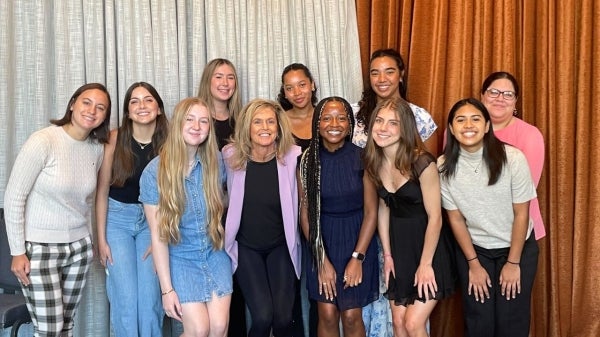ASU Law lecture explores law, Latino communities through music

David Lopez, visiting distinguished professor, is the former co-dean of Rutgers Law and served two terms as general counsel for the Equal Employment Opportunity Commission. He delivered his lecture “The Law and the Liminality of Latine Communities in 5 Songs” to ASU students, faculty and community members on Oct. 18 at the Beus Center for Law and Society.
Puerto Rican rapper and singer Bad Bunny might not be the first name that comes to mind when you think about complex legal issues, but he’s top-of-mind for at least one law professor.
David Lopez, former co-dean of Rutgers Law, delivered a lecture titled “The Law and the Liminality of LatineA gender neutral term for Latino. Communities in 5 Songs” to ASU students, faculty and community members on Oct. 18 at the Beus Center for Law and Society. The lecture explored legal decisions and issues that have impacted a sense of belonging for Latino communities across history through music.
Lopez is the Sandra Day O'Connor School of Law's inaugural visiting distinguished professor, and has served two terms as general counsel for the Equal Employment Opportunity Commission. And because he is an ASU alum, the visiting professorship serves as a homecoming for the Phoenix native.
Willard H. Pedrick Dean and Regents and Foundation Professor of Law Stacy Leeds introduced Lopez to the crowd, calling his time here an “extra treat” for law students.
“He is a brilliant legal mind and a connoisseur of the arts, culture and a music man,” she said.
Lopez began his hour-long lecture with memories of his time as an ASU student, particularly the impact of the community he formed with other Latino students. They would meet in between classes in front of Hayden Library at the Tempe campus to bond and commiserate over their similar struggles.
“It was a horizontal space of love where we could be ourselves,” he said of the gathering spot, which was a brief respite from the liminalities they faced. Liminality, as defined by Lopez, speaks to an in-between status.
“Laws constructed liminal statuses that intersect for a large portion of Latine communities,” he said. “They often live in a constant state of displacement.”
Lopez went on to describe several of those liminalities through five songs, including “El Apagón” by Bad Bunny.
“El Apagón” describes the blackouts suffered by Puerto Rico in the aftermath of Hurricane Maria in 2017 and the ongoing displacement of Puerto Ricans due to tax policies.
The issues discussed in the song are summed up in the 1901 case Downes v. Bidwell, which addressed whether the Foraker Act violated the U.S. Constitution since Puerto Rico is part of the U.S.
The act instituted a civilian government in the territory. The Supreme Court ultimately decided the Constitution did not follow the flag, arguing that Puerto Rico is “foreign in a domestic sense.”
Another song Lopez cited was “Clandestino” by Lila Downs, which refers to Mexicans crossing the border into the U.S. to go to work — a widespread practice that continues today. The Bracero farm labor program was in place from 1942 to 1964, leaving many with rich lives on both sides of the border. But the practice also makes the group more exploitable, Lopez said.
He cited the case National Labor Relations Board v. Hoffman Plastics of 1982, in which an undocumented man whom the plastics company hired tried to organize in the face of unfair treatment and was fired. The board awards backpay to those who were wrongly fired, but Hoffman Plastics said they didn't have to since the man wasn’t a citizen. The Supreme Court did not award him the backpay.
In summing up his lecture, Lopez acknowledged the rarity of exploring the law through a cultural lens but argued that music is just as effective in conveying essential messages as anything else, if not more so.
“Music reflects and makes an argument and is an argument itself,” he said. “It’s also resistance against unjust structures.”
More Law, journalism and politics

Cronkite School launches Women Leaders in Sports Media live-learn program
Women in a new sports media program at Arizona State University got a solid game plan from a sports veteran at an Aug. 20 welcome…

ASU center to host the Pursuits of Education and Excellence Symposium
The Center for the Study of Race and Democracy (CSRD) at Arizona State University is introducing the Pursuits of Education and…
ASU journalism students dominate NATAS Student Production Award nominations
Students at Arizona State University’s Walter Cronkite School of Journalism and Mass Communication dominated the nominations…